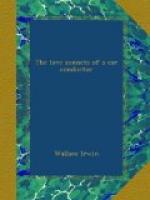“Smith was held for manslaughter, but Judge O’ Rafferty, who had seen ‘The Girl and the Idiot,’ discharged the defendant, averring that the killing of Pangwyn did not constitute a crime.”
What, then, has become of this minstrel who sang the Minnelieder of the Car-barns? Like Homer, like Omar, like Sappho, like Shakespeare, he is a Voice singing out of the mists. He was but a Name to his employers; and his friends, if he has friends, remember him not. These Sonnets, written neatly on twenty-six violet transfer-slips, were discovered, together with a rejection blank from a leading magazine, in the Dead Letter office. According to the current folk-lore in Harlem and the Bronx, Smith is now living in California employed as a brakeman on the Southern Pacific Railroad. Some aver that Pansy fell heiress to a sausage establishment and moved to Italy with her Poet. Still others maintain that Pansy, Gill the Grip and Maxy the Firebug never existed in real life — were merely the mind-children of a Symbolist and a dreamer of dreams.
To the latter theory I incline at a scholarly angle. This Cycle may be taken, perhaps, not so much as a living record of human experience as a lofty parable sounding the key-note of all human life. Gill the Grip is the Iago, the Mefistofele, the symbolism of a malevolent destiny. Maxy the Firebug may be the Poet’s interpretation of the Social Unrest, of Doubt, of progressive irresponsibility. Would it be going too far, then, to say that Pansy stands to us as the symbol of Pan-girlism — as an almost Anacreontic yearning for the type? Or may not these Sonnets be taken, in a way, as a modern Vita Nuova wherein a Sixth Avenue Alighieri calls to his Beatrice and mourns within when,
“Pansy-girl refuses to occur?”
So much for the Poet and his Purpose. Should any one of the readers of this Cycle doubt the enduring greatness of the lines, let him consider that I, Wolfgang Copernicus Addleburger, have seen fit to introduce them to immortality.
[1] Since the salary-books of the Metropolitan Street Railways show, during the year 1906, 182 conductors named Smith in their employ, 38 of whom were named William Smith and 12 William Henry Smith, it is easy for the reader to conceive my task in establishing the identity of our Poet. W. C. A.
The Love Sonnets of a Car Conductor
Prologue
Did some one ask if I am on the job?
I sure am to the pay-roll with my lay,
A hot tabasco-poultice which will stay
Close to the ribs and answer throb-to-throb.
Here have I chewed my Music from the cob
And followed Passion from the get-away
Past the big Grand Stand where the Pousse-Café
Christens my Muse as Jennie-on-the-Daub.
Hark ye, all marks who break the Pure Fool Law,
How I, the Windy Wonder of the Age,
Have fought the Tender Passion to a draw
And got my mug upon the Sporting Page,
Since Love and I collided at the curve
And left me with a Dislocated Nerve.




